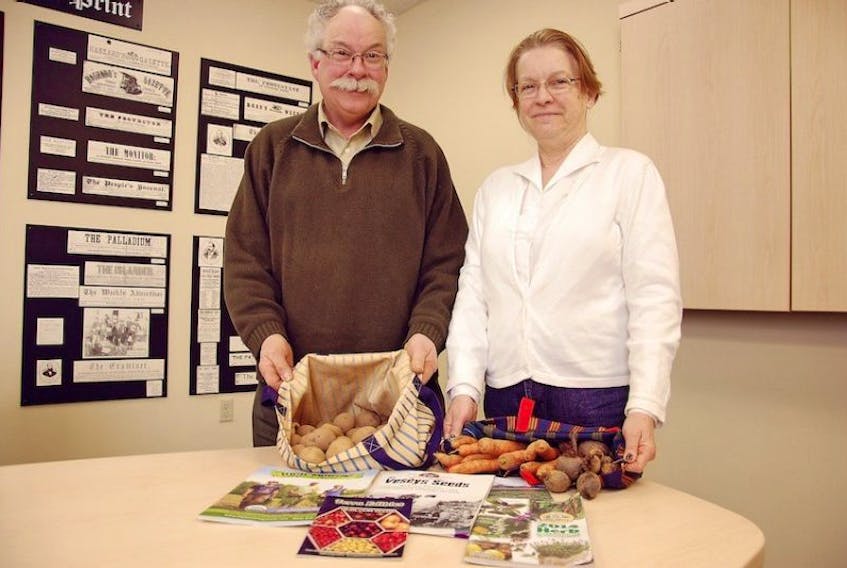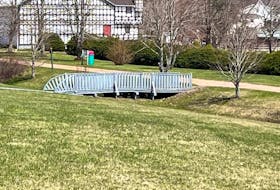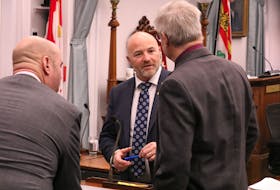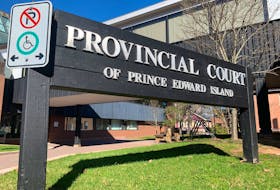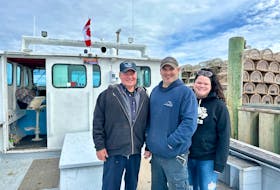In a world where tomatoes can come from Mexico and carrots from California, there's an easy, simple way to connect directly to the source of the food you eat.
In fact, some Prince Edward Island farmers like James Rodd and Rita Jackson are on first name basis with clientele who have signed up for their community supported agriculture (CSA) program, which is a subscription-based service where community members support farmers by providing capital investment through share fees. This seed money allows farmers to invest in producing quality local food that picked fresh for the consumer, typically on a weekly basis.
"For me it's like having a bigger family . . . ," says Jackson, who along with her husband, James Rodd, will be at the P.E.I. Food Security Network's free CSA workshop at the Farm Centre in Charlottetown on Wednesday, Feb. 5 from 4-7 p.m.
CLICK HERE FOR MORE INFORMATION ON THE WORKSHOP
This workshop will have a little something for everyone: food, discussion, demonstration booths.
"If you don't know a farmer, get to know a farmer. And if you can source out a CSA, try it. The difference is on the plate," says Rodd, who is now in his seventh year of being a CSA producer on their RJR 100 Acre Farm in North Milton, which was converted from conventional farming to organic in 1997.
Each CSA producer has his or her way of presenting the program to the public. In the case of RJR 100 Acre Farm, it is a 16-week program that begins around the first week of July and continues on into the fall.
As many as 42 share members have received weekly deliveries of reusable CSA cloth bags filled with produce that changes as the season goes on.
That list includes things like beet greens, Swiss chard, kale, lettuce, peas, beans, broccoli, cucumbers, tomatoes, eggs, apples and a bevy of fall root crops, squash and more.
"Every week our people get an email telling them what is going to be in their (bag). We also give them suggestions on cooking and recipes because a lot of people don't know how to use some of the vegetables," Jackson says.
CSA farmers can also tailor some of the coming crop to suit the tastes of share members.
"We actually talk to them and ask "What do you like? Is there something in particular,'" Jackson says.
"We've had all kinds of encouragement to grow an herb garden this year," Rodd adds.
"We've had basil and parsley and dill (before) but we're going to gave the full gamut of herbs this year and devote a full section to that."
Many of their clientele take advantage of the open invitation to visit the farm, often helping with the weeding and harvesting of the very crops that will be in their weekly CSA delivery.
"We have a relationship and that's an important thing with producing food for the consumer," Rodd adds.
"If the consumer knows the farmer and knows that there is integrity in the producing of that crop or that livestock then that consumer can get connected to how that food is produced, and get connected to the land, which a lot of people aren't. They look at soil as being something dirty when in fact it's a living organism."
The upcoming CSA workshop showcases the benefits of a CSA program.
"We see (community supported agriculture) as one viable option to increase sustainable distribution for farmers, but certainly not the only option. It's more of a combination that's important, like gardens, markets and CSAs," says Hanna Hameline, chair of P.E.I. Food Security Network's sustainable production and distribution working group.
CSAs also help to revival the rural regions by increasing a sense of community.
"It definitely increases agro-biodiversity because the farmer isn't going to just grow carrots and sell you only carrots the entire year. So it definitely increases the selection of crops and supports mixed farming," Hameline adds.
"It creates a connection between farmers and citizens, which has been lost. It supports the local farmer, which is disappearing on P.E.I. and globally so in that sense it definitely revives the rural community."
In a world where tomatoes can come from Mexico and carrots from California, there's an easy, simple way to connect directly to the source of the food you eat.
In fact, some Prince Edward Island farmers like James Rodd and Rita Jackson are on first name basis with clientele who have signed up for their community supported agriculture (CSA) program, which is a subscription-based service where community members support farmers by providing capital investment through share fees. This seed money allows farmers to invest in producing quality local food that picked fresh for the consumer, typically on a weekly basis.
"For me it's like having a bigger family . . . ," says Jackson, who along with her husband, James Rodd, will be at the P.E.I. Food Security Network's free CSA workshop at the Farm Centre in Charlottetown on Wednesday, Feb. 5 from 4-7 p.m.
CLICK HERE FOR MORE INFORMATION ON THE WORKSHOP
This workshop will have a little something for everyone: food, discussion, demonstration booths.
"If you don't know a farmer, get to know a farmer. And if you can source out a CSA, try it. The difference is on the plate," says Rodd, who is now in his seventh year of being a CSA producer on their RJR 100 Acre Farm in North Milton, which was converted from conventional farming to organic in 1997.
Each CSA producer has his or her way of presenting the program to the public. In the case of RJR 100 Acre Farm, it is a 16-week program that begins around the first week of July and continues on into the fall.
As many as 42 share members have received weekly deliveries of reusable CSA cloth bags filled with produce that changes as the season goes on.
That list includes things like beet greens, Swiss chard, kale, lettuce, peas, beans, broccoli, cucumbers, tomatoes, eggs, apples and a bevy of fall root crops, squash and more.
"Every week our people get an email telling them what is going to be in their (bag). We also give them suggestions on cooking and recipes because a lot of people don't know how to use some of the vegetables," Jackson says.
CSA farmers can also tailor some of the coming crop to suit the tastes of share members.
"We actually talk to them and ask "What do you like? Is there something in particular,'" Jackson says.
"We've had all kinds of encouragement to grow an herb garden this year," Rodd adds.
"We've had basil and parsley and dill (before) but we're going to gave the full gamut of herbs this year and devote a full section to that."
Many of their clientele take advantage of the open invitation to visit the farm, often helping with the weeding and harvesting of the very crops that will be in their weekly CSA delivery.
"We have a relationship and that's an important thing with producing food for the consumer," Rodd adds.
"If the consumer knows the farmer and knows that there is integrity in the producing of that crop or that livestock then that consumer can get connected to how that food is produced, and get connected to the land, which a lot of people aren't. They look at soil as being something dirty when in fact it's a living organism."
The upcoming CSA workshop showcases the benefits of a CSA program.
"We see (community supported agriculture) as one viable option to increase sustainable distribution for farmers, but certainly not the only option. It's more of a combination that's important, like gardens, markets and CSAs," says Hanna Hameline, chair of P.E.I. Food Security Network's sustainable production and distribution working group.
CSAs also help to revival the rural regions by increasing a sense of community.
"It definitely increases agro-biodiversity because the farmer isn't going to just grow carrots and sell you only carrots the entire year. So it definitely increases the selection of crops and supports mixed farming," Hameline adds.
"It creates a connection between farmers and citizens, which has been lost. It supports the local farmer, which is disappearing on P.E.I. and globally so in that sense it definitely revives the rural community."
The P.E.I. Food Security Network is hosting a workshop on the topic of Community Supported Agriculture (CSA) on Wednesday, Feb. 5 from 4-7 p.m. at the Farm Centre, 420 University Ave., Charlottetown
The workshop will highlight CSA on Prince Edward Island as one viable option for sustainable production and distribution. It will provide P.E.I. CSA producers an opportunity to share their knowledge and CSA customers/sharers will have a chance to share their experiences. And, it will showcase the individual CSA producers' offerings and provide sign-up options
This event is free of charge. Supper is included, but space is limited. All are invited.
Pre-registration is required before Jan. 28.
To pre-register: Cooper Institute 894-4573 or email [email protected] with your name.

